Swimming pool heating: self-help methods and tips available
In this article we will talk about how to independently implement heating pools with the use of affordable equipment. Despite the fact that the pool on the plot is still considered a luxury, the topic of heating these facilities is relevant and is of considerable interest.
The choice of heat source and the method of heating limited spaces with an artificial reservoir inside depends on many criteria, among which are the size and configuration of the facility, seasonality of operation, frequency of water changes, type of ventilation used, area and other dimensions of the building in which the pool is equipped.
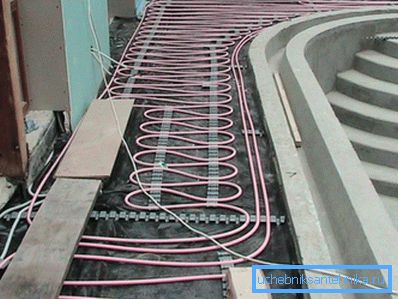
Current pool heating technologies
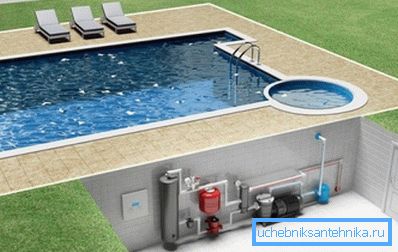
The market offers a wide range of technologies suitable for heating indoor pools.
But in relation to self-implemented projects include the following solutions:
- water heating by a heat exchanger connected to the water circuit of the heating system;
- the use of electric heaters (heating elements);
- heat pump application for heating.
Each of these methods has specific features that need to be considered when choosing an option that is suitable for arranging this or that object.
The use of heat exchange heater
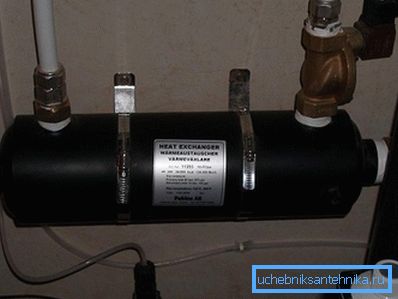
One of the most simple and affordable methods of heating pools is the use of a heat exchanger connected to the central heating of a country house.
The principle of operation in this case is the following - the heated coolant circulates in a water circuit laid in the immediate vicinity of the pool bowl. As a result, the incoming water is heated to the required temperature, releasing a certain amount of thermal energy into the room.
Among the advantages of the method we note the following:
- the possibility of using one boiler for the house and the pool and, as a result, saving space required for the equipment of the boiler room;
- low price of the system, since the heating device will cost no more than making a “warm floor”;
- the simplicity of the system and, as a consequence, the possibility of mounting their own hands.
However, there are drawbacks:
- It will not be possible to operate the boiler designed only for heating the house, since it will be necessary to install a structure with a much greater capacity.
- Due to the heating of the water in the pool room, excessive evaporation is possible, and therefore it will be necessary to arrange a system for controlling the moisture content in the air.
Important: The last property is typical for all methods of heating pools. Therefore, the design and implementation of the ventilation and drainage system must be considered when planning the heating system.
Electric Heater Use
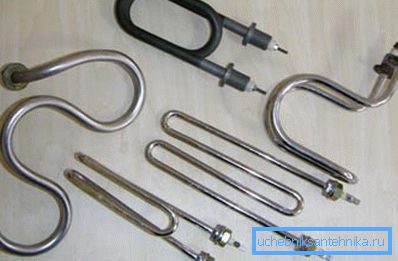
If the power of the heating boiler is not enough, the problem of heating the pool can be solved by installing a special electric heater.
The principle of operation of such a system is extremely simple. The electric heater is in direct contact with water and when turned on it heats it to the required temperature.
For efficient use, in addition to the electric heaters themselves, the system includes thermostats that regulate the water temperature and turn off the heating elements when the temperature reaches the required level.
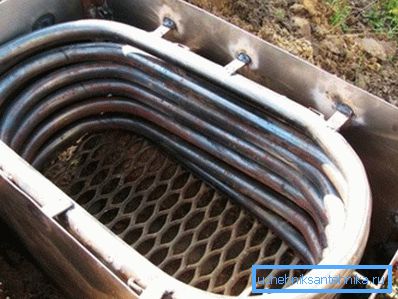
TEN and its power parameters are selected in accordance with the volume of the pool. The range of specialized heaters includes a wide range of equipment, starting with compact models designed for use in small objects, up to powerful equipment designed for heating large swimming pools.
Important: The choice of heater depends to some extent on the hardness of the water. For example, if the content of chlorides in the water is exceeded, it is advisable to install special titanium-coated heating elements.
Among the advantages of using heating elements as a heat source, we note such moments as:
- the ability to quickly heat the required volume of water;
- easy installation of the system with your own hands;
- wide range of heaters and the ability to choose the device of suitable power;
- the possibility of building a partially or fully automated pool heating system.
Among the disadvantages of the solution, we note:
- considerable power consumption;
- inability to use in homes with old wiring, not designed for high power consumption.
Features of operation of heat pumps
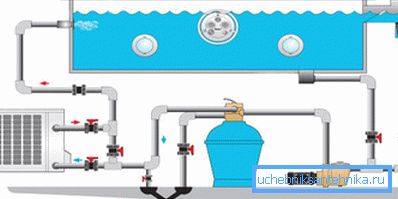
Many have heard anything about heat pumps, but few know what this equipment is and how it works. Meanwhile, the operating instructions for these installations are simple and the cost of electricity is minimal.
The principle of operation of the device consists in taking thermal energy from the environment and in releasing this energy into the heat exchanger, which passes through the pool basin.
According to the manufacturers, for 1 kW of electricity consumed, the heat pump from the environment receives energy equivalent to 5 kW. Thus, if heating the pool with heating elements requires 20 kW of electricity, the use of a heat pump will reduce this number to 4 kW.
The advantages of heat pumps include the following:
- operational safety;
- the ability to automate the heating process through the use of thermostats;
- really low cost of heating;
- compact dimensions of the equipment and, as a result, ease of organization of the boiler room;
- reliability and durability of equipment.
But there is a significant drawback - this is a high price of equipment. The cost of heat pumps starts from 10 thousand euros. However, if we compare the cost of the installation with the price of heating, we can assume that the funds invested in the purchase of equipment, one way or another, will be justified.
So, we have considered the most popular methods of heating pools. It remains to determine the method of controlling the parameters of moisture content in the air.
Control of moisture content in the air
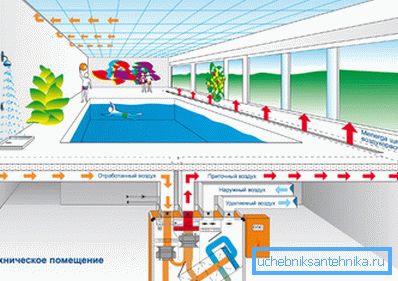
Do you know that it is not enough just to heat the water in the pool and rely on the fact that the operation of the facility will be comfortable? The fact is that when heated, water evaporates in large quantities, settling on the ceiling and walls.
If you do not learn to control this process, it will be damp in the indoor pool and, as a result, the conditions most favorable for the appearance of mold and other pathogens will be created.
The effective ways to solve the problem of excess moisture include:
- the use of air dryers;
- device effective ventilation system;
Important: Excessive humidity in the pool leads to the fact that even when heating is on, the perception of temperature will be uncomfortable.
Dehumidifiers, passing air through themselves, take moisture, turning it into condensate, which is discharged to the outside or disposed of in other ways. The work of dehumidifiers can be combined with the operation of heating equipment.
As a result, when the temperature of the water in the pool rises, the dryer will work with more power than in normal mode.
Conclusion
Now that you know what the features of pool heating are, you can choose the technology that will fit your needs and abilities. If you have any questions, more useful information can be found by watching the video in this article.